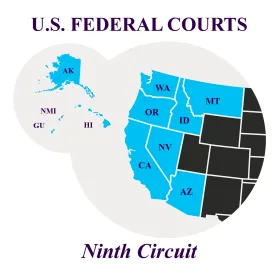The US Court of Appeals for the Ninth Circuit explained that to be a derivative work, a program interoperative with another must actually incorporate aspects of the underlying work. The Court further ruled that licensees of a copy of a computer program are not “owners” of the copy and therefore are not entitled to make copies for the purposes permitted by 17 U.S.C. § 117(a). Oracle International Corp. v. Rimini Street, Inc., Case No. 23-16038 (9th Cir. Dec. 16, 2024) (Bybee, Bumatay, Bennett, JJ.)
Rimini provides third-party support for Oracle software and is a direct competitor with Oracle in the software support services market. For more than a decade, Oracle and Rimini have been involved in what the Ninth Circuit describes as a “pitched copyright war.” This latest battle relates to changes Rimini made to its business model after a district court determined that Rimini had infringed Oracle’s copyrights. Rimini developed a new process for servicing customers using Oracle software and sought a declaratory judgment that its revised process did not infringe Oracle’s copyrights. Oracle counterclaimed for copyright infringement and Lanham Act violations.
The district court found that Rimini created infringing derivative works because its new process interacted and was usable with Oracle software. The district court found that Rimini violated Oracle’s PeopleSoft and Database licensing agreements and made several statements violating the Lanham Act. The court struck Rimini’s affirmative defense to copyright infringement under 17 U.S.C. § 117(a), granted Oracle summary judgment that Rimini infringed Oracle’s copyrights, and issued a permanent injunction against Rimini. Rimini appealed.
Derivative Works
The Ninth Circuit disagreed with the district court’s analysis of Rimini’s new process, noting that the district court focused on an “interoperability test,” which does not exist under the text of the Copyright Act or in precedent. In effect, the district court’s test would find that if a product interoperates with a preexisting copyrighted work, then it must be derivative. The Ninth Circuit explained that while the Copyright Act uses broad language to describe derivative works, the derivative work must actually incorporate the underlying work. For Rimini’s new process to be a derivative work, it must incorporate Oracle’s copyrighted work, either literally or nonliterally. The Court found that just because Rimini’s new process interacted with Oracle’s software, that was insufficient to find it was a derivative work.
Affirmative Defense: Section 117(a)
The Copyright Act permits an owner of a copy of a computer program to make a copy or adaptation of that program for certain purposes under 17 U.S.C. § 117(a). The Ninth Circuit vacated the district court’s ruling, striking Rimini’s affirmative defense under Section 117(a), because the district court erred in determining whether Oracle’s customers “owned” a copy of Oracle’s software, PeopleSoft. The Court explained that to determine whether a party is an “owner of a copy” of a computer program, the courts look to whether the party has “sufficient incidents of ownership” over the “copy” of the software, in view of the totality of the parties’ agreement. Factors that the Court considered include:
- Whether the copyright owner specifies that a user is granted a license
- Whether the parties’ arrangement significantly restricts the user’s ability to transfer the software
- Whether the agreement imposes notable use restrictions
The Ninth Circuit noted that other incidents of ownership may be considered, including whether the user paid significant consideration to develop the programs for the sole benefit of the user and whether the user could use the program forever, regardless of whether the parties terminated their relationship.
Copyright Infringement
The Ninth Circuit vacated the district court’s ruling that Rimini’s creation of “gap customer” environments on its systems containing Oracle’s Database program infringed Oracle’s copyright because the plain language of the licensing agreement did not prohibit third-party support providers from possessing a copy of Oracle’s software to further a client’s internal business operations. The Ninth Circuit also vacated the district court’s ruling that Rimini’s use of automated tools to deliver PeopleSoft program updates to clients constituted copyright infringement, to the extent that the conclusion rested on the district court’s erroneous view of “derivative work.”
False Advertising
The Lanham Act prohibits a person from making a false or misleading description or representation of fact about goods or services in commercial advertising or promotion. But false advertising doesn’t extend to statements of opinion and puffery. The Ninth Circuit found that Rimini’s security-related statements did not constitute false advertising under the Lanham Act, except for a statement about “holistic security.” Some of the statements were about the relative security of services offered by Oracle and Rimini, which the Court held were puffery. Some of the statements were about the need for software patching, which the Court could not say were so specific and measurable as to become actionable under the Lanham Act. The Ninth Circuit reversed the district court’s ruling as to these statements.
However, the Ninth Circuit affirmed the district court’s finding that Rimini’s offer of holistic security, which the Court accepted to mean multilayered security protection, was false because Rimini does not offer multilevel security.




 />i
/>i
